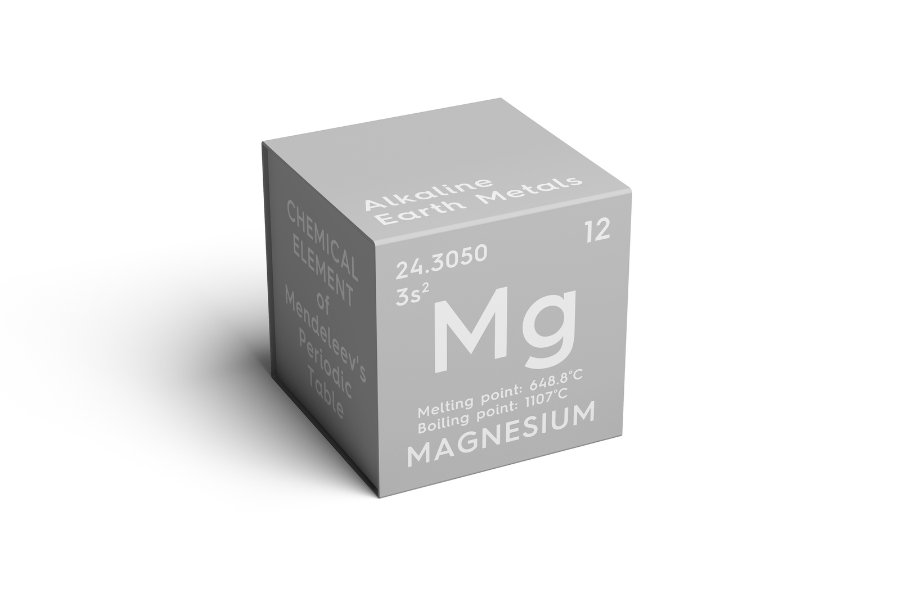Magnesium: The Wellness Warrior in Your Corner

It is truly a tragedy that early education fails to teach nutrition as part of the core curriculum. We may have received the “eat your vegetables, or you can’t have dessert” warnings from our family members, but no one ever mentioned the specific details as to WHY. Generalizing healthy foods as fruits and vegetables can also be misleading: nutrient content varies across different plants, and some are healthier than others. Allergies exist, and not all edible plants are safe for everyone. We have to be a little more specific by considering the essential vitamins and minerals our bodies need and developing a better understanding of why we need them. Magnesium, for example, plays a crucial role in over 300 enzymatic reactions in the body, influencing everything from muscle function to energy production. Yet, despite its significance, magnesium deficiency is increasingly common, so this blog aims to shed light on magnesium's critical functions, the signs of deficiency, and how to ensure adequate intake for optimal health.
Magnesium Aids Muscle and Nerve Function
Magnesium helps our muscles work correctly by managing how much calcium gets into our muscle cells. Calcium gets into the muscle cells when our muscles need to tighten up or contract. After the muscles have done their job and need to relax, calcium must be moved out of these cells. Magnesium controls how much calcium stays inside, acting like a gatekeeper. It ensures calcium doesn't hang around too long, keeping the muscles tight and leading to cramps. So, magnesium helps our muscles relax after they contract. If we don't have enough magnesium, our muscles might contract too much and not relax properly, causing cramps or spasms. Getting the right balance of magnesium and calcium is vital to keeping our muscles working smoothly without getting too tense or cramped, especially after exercise or when stressed.
Magnesium also plays a crucial role in how our nervous system functions. Essentially, it helps manage the levels and activity of neurotransmitters, which are the brain's chemical messengers. These messengers allow nerve cells to communicate with each other. Magnesium ensures that these neurotransmitters aren't too abundant or too scarce in the spaces between nerve cells, helping to keep nerve activity balanced. Think of magnesium as a moderator that prevents our nerves from getting too excited, which can lead to feelings of anxiety or trouble sleeping.
The calming effect of magnesium on muscles and nerves translates into broader benefits for mood, sleep, and stress management—magnesium aids in producing serotonin. This neurotransmitter promotes feelings of well-being and happiness. A proper balance of magnesium is essential for maintaining mental health, as it can help reduce symptoms of depression and anxiety.
For sleep, magnesium's muscle-relaxing and nerve-calming properties can help prepare the body for rest, making it easier to fall asleep and stay asleep. Its role in regulating neurotransmitters like GABA (gamma-aminobutyric acid) also promotes relaxation, which is crucial for a restful night.
Magnesium for Bone Health
While people widely recognize calcium's critical role in building and maintaining strong bones, magnesium's contribution to bone health is equally vital, though it often receives less spotlight. Magnesium primarily supports bone health by activating vitamin D. The body needs vitamin D to absorb calcium in the intestines; without vitamin D, the body cannot effectively use calcium to strengthen bones.
The process of bone remodeling, which breaks down old bone tissue and replaces it with new tissue, also relies on magnesium's power. Magnesium regulates this process to ensure a balance between the breakdown and formation of bone tissue. If the balance tips, especially with too much breakdown and insufficient replacement, bones can weaken.
Magnesium and Energy Production
Magnesium is vital in converting food into energy. It assists in activating ATP (adenosine triphosphate), the energy molecules in our cells. Individuals with adequate magnesium levels often experience improved exercise performance, reduced fatigue, and better endurance. Conversely, a magnesium deficiency can lead to decreased energy levels, lethargy, and an increased sensation of fatigue during physical and mental activities.
Magnesium Supports our Immune System
Magnesium contributes to a healthy immune system by synthesizing antibodies that fight off diseases and infections. It acts as a co-factor for various biochemical reactions essential to immune defense mechanisms, helping the body to ward off or recover from illness.
Impact on Hormonal Balance and Pregnancy
Magnesium's importance cannot be overstated for women, particularly concerning hormonal balance and pregnancy. It can help regulate cortisol levels, the stress hormone, thus reducing stress and improving mood. During pregnancy, adequate magnesium levels are vital for maintaining the health of both mother and fetus. It helps reduce the risk of osteoporosis in mothers and plays a critical role in the development of the fetal nervous system and skeletal system.
The Importance for Postmenopausal Women
For postmenopausal women, maintaining adequate magnesium levels becomes increasingly important. The hormonal changes that occur after menopause can negatively impact bone health, making women more susceptible to osteoporosis. Magnesium's roles in activating vitamin D, enhancing calcium absorption, and maintaining bone mineral density are crucial for counteracting these risks and promoting strong, healthy bones.
The Importance for Healthy Hair Growth
We mentioned earlier that magnesium acts as a calcium blocker in muscle cells. It performs a similar function by blocking calcium buildup in the scalp to ensure healthy hair follicles. Magnesium also helps to widen blood vessels, a process known as vasodilation. This improved blood flow to the scalp ensures that hair follicles receive more oxygen and nutrients, which are essential for healthy hair growth.
Hair is primarily made up of a protein called keratin. Magnesium plays a crucial role in protein synthesis, including keratin formation. This process is vital for hair structure and strength, promoting healthy growth. And while magnesium is busy making our hair stronger, it is also fighting back against hormones that trigger hair loss. Talk about a boss, Queen!
Recognizing the Signs of Magnesium Deficiency
The body is quick to signal when magnesium levels dip too low. Symptoms of deficiency can range from muscle cramps and spasms to fatigue, high blood pressure, irregular heartbeats, and even mood disorders like anxiety and depression. Women may find these symptoms particularly impactful, as magnesium deficiency can exacerbate hormonal imbalances and increase the risk of conditions like osteoporosis. If you suspect a magnesium deficiency is the cause of symptoms, it’s essential to talk to your doctor immediately for treatment.
How Is Magnesium Deficiency Diagnosed?
While blood tests can measure magnesium levels, they don't always provide the whole picture, as magnesium is primarily stored in bones and soft tissues. Healthcare professionals may also examine symptoms, dietary habits, and other indicators to assess magnesium status. This multifaceted approach ensures a more accurate diagnosis and tailored treatment plan.
Boosting Magnesium Intake: Foods Rich in Bioavailable Magnesium
Fortunately, many delicious and nutritious foods are rich in magnesium. Incorporating green leafy vegetables, nuts, seeds (especially pumpkin, chia, and flax seeds), whole grains, legumes, dark chocolate, fatty fish, and avocado can significantly improve your magnesium intake. Simple dietary adjustments can make a big difference, like opting for magnesium-rich snacks or including a side of leafy greens with meals.
Supplementation: When It's Needed and Potential Dangers
For some, dietary changes alone may not be enough to correct magnesium deficiency, making supplementation a viable option. However, it's crucial to navigate supplementation carefully, as excessive intake can lead to side effects such as diarrhea, nausea, and an imbalance of other minerals.
Conclusion
While our bodies are super complex, and many other vitamins and minerals play essential roles in keeping our minds, bodies, and hair ultra healthy, we hope shining light on magnesium has helped support your wellness journey. Always consult your primary care physician before taking any supplements, and let your food be your ultimate healer. Cheers to a healthier you!








Comments